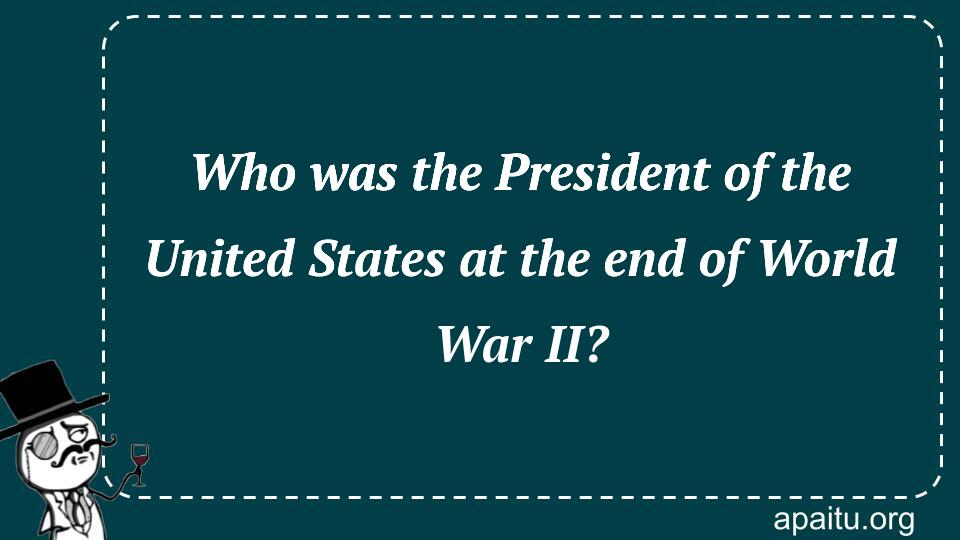Question
Here is the question : WHO WAS THE PRESIDENT OF THE UNITED STATES AT THE END OF WORLD WAR II?
Option
Here is the option for the question :
- Richard Nixon
- Woodrow Wilson
- Harry S. Truman
- Zachary Taylor
The Answer:
And, the answer for the the question is :
Explanation:
Franklin D. Roosevelt passed away on April 12, 1945, while serving an unusual fourth term as president. Harry Truman, Roosevelt’s vice president, succeeded him as president and oversaw the end of the war, which included the May and September surrenders of Germany and Japan. After winning reelection in 1948, Truman guided the United States through the early years of the Cold War.

Harry S. Truman: The President at the Crossroads of History
As World War II reached its climactic end, the United States found itself under the leadership of a man who would play a pivotal role in shaping the post-war world. That man was Harry S. Truman, who assumed the presidency upon the death of Franklin D. Roosevelt on April 12, 1945. In this article, we explore the life and presidency of Harry S. Truman, the challenges he faced as the war drew to a close, and the enduring legacy he left behind.
Harry S. Truman, born on May 8, 1884, in Lamar, Missouri, came from humble beginnings. His modest upbringing and early experiences in business and politics shaped his down-to-earth demeanor and pragmatic approach to leadership. Truman’s journey to the presidency was unexpected, as he was thrust into the role following the sudden passing of President Roosevelt during the final months of the war.
Truman’s presidency was marked by a series of monumental decisions and challenges. One of the most significant was the decision to drop atomic bombs on Hiroshima and Nagasaki, effectively ending the war with Japan. This decision, while controversial, was made in the interest of hastening the war’s conclusion and saving American lives that would have been lost in a prolonged invasion of Japan.
Truman faced the formidable task of overseeing the post-war reconstruction and establishing a new world order. The United Nations was founded under his administration, with the aim of promoting peace and international cooperation. Truman played a key role in shaping the organization and ensuring that the United States took a leading role in global affairs.
Truman’s presidency also saw the beginning of the Cold War, a period of intense geopolitical tension between the United States and the Soviet Union. The Truman Doctrine, implemented in response to Soviet aggression in Greece and Turkey, established the policy of containment, which aimed to prevent the spread of communism. Truman’s commitment to combating the Soviet threat laid the foundation for the United States’ foreign policy for decades to come.
Domestically, Truman faced the challenge of transitioning the country from a wartime economy to peacetime. He championed policies aimed at promoting economic growth and social welfare, such as the Fair Deal, which included proposals for universal health care, civil rights legislation, and affordable housing. While many of these initiatives faced opposition and limited success during Truman’s presidency, they laid the groundwork for future reforms and advancements.
Truman’s presidency also witnessed significant strides in the civil rights movement. He issued executive orders desegregating the armed forces and established a committee on civil rights to address racial inequality. Although progress was incremental, Truman’s actions set the stage for the landmark civil rights legislation that would come to fruition in the following decades.
Truman left a lasting legacy. His commitment to international cooperation and the containment of communism laid the groundwork for U.S. foreign policy during the Cold War era. His support for civil rights and social welfare set the stage for subsequent advancements in equality and social justice. Truman’s plain-spoken demeanor, integrity, and steadfast leadership earned him respect and admiration both during his presidency and in the years that followed.
Harry S. Truman assumed the presidency of the United States at the end of World War II, a time of immense global challenges and opportunities. His decisions and actions during his presidency shaped the post-war world and laid the groundwork for the United States’ role as a global superpower. Truman’s legacy is one of leadership, pragmatism, and a commitment to the values of democracy and justice. His presidency serves as a reminder of the critical role that individuals can play in shaping history, even in the most uncertain and consequential of times.